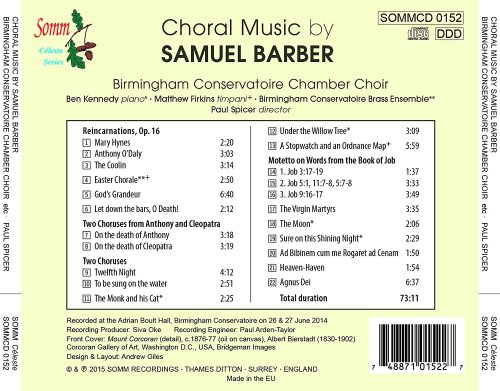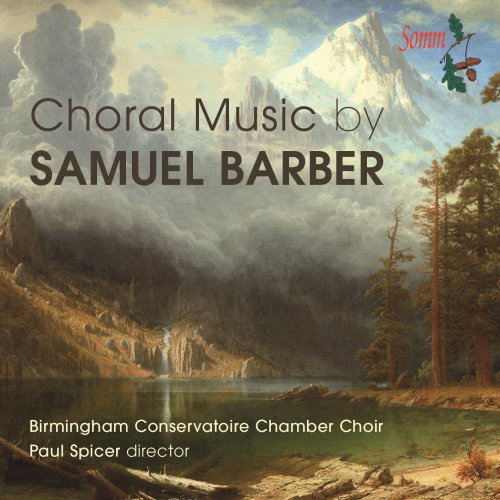
Ben Kennedy, Matthew Firkins, Birmingham Conservatoire Chamber Choir, Paul Spicer - Choral Music By Samuel Barber (2016)
BAND/ARTIST: Ben Kennedy, Matthew Firkins, Birmingham Conservatoire Chamber Choir, Paul Spicer
- Title: Choral Music By Samuel Barber
- Year Of Release: 2016
- Label: SOMM Recordings
- Genre: Classical
- Quality: flac lossless +Booklet
- Total Time: 01:13:10
- Total Size: 265 mb
- WebSite: Album Preview
Tracklist
01. Reincarnations, Op. 16: No. 1, Mary Hynes
02. Reincarnations, Op. 16: No. 2, Anthony O'Daly
03. Reincarnations, Op. 16: No. 3, The Coolin
04. Chorale for Ascension Day
05. God's Grandeur
06. Let Down the Bars, O Death, Op. 8 No. 2
07. 2 Choruses: No. 1, On the Death of Antony
08. 2 Choruses: No. 2, On the Death of Cleopatra
09. Twelfth Night, Op. 42 No. 1
10. To Be Sung on the Water, Op. 42 No. 2
11. The Monk and His Cat
12. Under the Willow Tree
13. A Stopwatch and an Ordnance Map, Op. 15
14. Motetto: No. 1, There the Wicked Cease
15. Motetto: No. 2, Call Now!
16. Motetto: No. 3, God's Grandeur
17. The Virgin Martyrs, Op. 8 No. 1
18. Rounds: No. 8, The Moon
19. Sure on This Shining Night
20. Ad bibinem cum me regaret ad cenam
21. Heaven-Haven
22. Agnus Dei (After Adagio for Strings, Op. 11)

This fourth disc in Somm's series of recordings with Paul Spicer and his Birmingham Conservatoire Chamber Choir gives us most of Samuel Barber's utterly beautiful, neo-Romantic choral music.
Barber wrote a great deal of choral music, written in a traditional 19th century tonal idiom despite the fact that his critics called it 'utterly anachronistic and passé', a criticism to which he remained largely impervious. There was no denying however, that Barber's technical brilliance and emotional immediacy placed him at the forefront of American music.
Setting texts for chorus or solo songs formed a large part of Barber's creative life. At the heart of his self-expression was an intimate relationship with the text he was setting. He was fond of British and Irish literature and read poetry ardently, marking texts he might later use, and honing vocal pieces until he was satisfied that they reflected the rhythm, contour, and meaning of words. Barber's use of alternating homophonic and contrapuntal textures as well as sombre harmonies reflect his interest in early Baroque choral music.
Much of his music exposed his melancholy but he also had a kind, gregarious, likable side to his character, seen here in works like the three 'Reincarnations' and 'The Monk and His Cat'. Barber's Agnus Dei, heard here in his own arrangement of the famous Adagio for Strings has gained the same prominence as its instrumental counterpart.
Barber's music reflects the many sides of a complex man who, despite his warmth and humour could never fully escape his own sadness. "I myself wrote always as I wished, and without a tremendous desire to find the latest thing possible... I wrote as I wanted to for myself", he once declared.
01. Reincarnations, Op. 16: No. 1, Mary Hynes
02. Reincarnations, Op. 16: No. 2, Anthony O'Daly
03. Reincarnations, Op. 16: No. 3, The Coolin
04. Chorale for Ascension Day
05. God's Grandeur
06. Let Down the Bars, O Death, Op. 8 No. 2
07. 2 Choruses: No. 1, On the Death of Antony
08. 2 Choruses: No. 2, On the Death of Cleopatra
09. Twelfth Night, Op. 42 No. 1
10. To Be Sung on the Water, Op. 42 No. 2
11. The Monk and His Cat
12. Under the Willow Tree
13. A Stopwatch and an Ordnance Map, Op. 15
14. Motetto: No. 1, There the Wicked Cease
15. Motetto: No. 2, Call Now!
16. Motetto: No. 3, God's Grandeur
17. The Virgin Martyrs, Op. 8 No. 1
18. Rounds: No. 8, The Moon
19. Sure on This Shining Night
20. Ad bibinem cum me regaret ad cenam
21. Heaven-Haven
22. Agnus Dei (After Adagio for Strings, Op. 11)

This fourth disc in Somm's series of recordings with Paul Spicer and his Birmingham Conservatoire Chamber Choir gives us most of Samuel Barber's utterly beautiful, neo-Romantic choral music.
Barber wrote a great deal of choral music, written in a traditional 19th century tonal idiom despite the fact that his critics called it 'utterly anachronistic and passé', a criticism to which he remained largely impervious. There was no denying however, that Barber's technical brilliance and emotional immediacy placed him at the forefront of American music.
Setting texts for chorus or solo songs formed a large part of Barber's creative life. At the heart of his self-expression was an intimate relationship with the text he was setting. He was fond of British and Irish literature and read poetry ardently, marking texts he might later use, and honing vocal pieces until he was satisfied that they reflected the rhythm, contour, and meaning of words. Barber's use of alternating homophonic and contrapuntal textures as well as sombre harmonies reflect his interest in early Baroque choral music.
Much of his music exposed his melancholy but he also had a kind, gregarious, likable side to his character, seen here in works like the three 'Reincarnations' and 'The Monk and His Cat'. Barber's Agnus Dei, heard here in his own arrangement of the famous Adagio for Strings has gained the same prominence as its instrumental counterpart.
Barber's music reflects the many sides of a complex man who, despite his warmth and humour could never fully escape his own sadness. "I myself wrote always as I wished, and without a tremendous desire to find the latest thing possible... I wrote as I wanted to for myself", he once declared.
Year 2016 | Classical | FLAC / APE
As a ISRA.CLOUD's PREMIUM member you will have the following benefits:
- Unlimited high speed downloads
- Download directly without waiting time
- Unlimited parallel downloads
- Support for download accelerators
- No advertising
- Resume broken downloads


